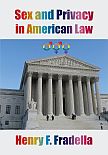Sex and Privacy in American Law (W. B. Sheridan Law Books)
Henry F. Fradella is Professor in the School of Criminology and Criminal Justice at Arizona State University, where he also holds affiliate appointments in law and in the interdisciplinary studies program on law and behavioral science. He received a B.A. in psychology from Clark University; a master’s in forensic science and a law degree from George Washington University; and his Ph.D. in justice studies from Arizona State University. He researches substantive and procedural criminal law, the dynamics of legal decision-making, and the consequences of changes in legal processes. His research has been funded by the National Science Foundation and the National Institute of Justice. He is the author or co-author of 12 books including Punishing Poverty: How Bail and Pretrial Detention Fuel Inequalities in the Criminal Justice System; Stop and Frisk: The Use and Abuse of a Controversial Police Tactic; Sex, Sexuality, Law, and (In)Justice; Mental Illness and Crime; Defenses of Excuse in American Law; a criminal law casebook; and four textbooks. He had written nearly 120 articles, book chapters, reviews, and scholarly commentaries. Dr. Fradella previously edited Criminology, Criminal Justice, Law & Society and the Journal of Contemporary Criminal Justice. He has served as Editor-in-Chief of the Criminal Law Bulletin since 2019.
 Sex and Privacy in American Law presents empirical analyses of civil and criminal state court decisions applying the U.S. Supreme Court’s landmark decision in Lawrence v. Texas. After tracing key historical and legal developments leading up to the Lawrence decision’s decriminalization of sodomy on substantive due process grounds in 2003, the study employs both quantitative and qualitative content analyses of 307 cases citing Lawrence over the two decades since it was decided. Results indicate that judicial decisions rarely embraced broad readings of Lawrence in criminal cases. In fact, Lawrence’s long-term impact on criminal law has largely remained as limited as some commentators predicted shortly after the case was decided. In civil cases, courts tended not to rely on Lawrence significantly in most business and employment law cases. Courts that applied Lawrence in family law disputes – especially those involving same-sex couples – often construed the case narrowly at first, but broadened their interpretations after Obergefell v. Hodges brought marriage equality to the United States. Lawrence also impacted LGBTQ+ civil rights claims. Statistically significant geographic differences were found relating to how courts used Lawrence in those cases, with judges in Northeastern and Pacific coastal states having applied the precedent broadly, while judges in Southern and Midwestern states tending to have applied the case more narrowly. The implications are explored generally and within the specific context of the constriction of substantive due process rights in the wake Dobbs v. Jackson Women's Health Organization.
Sex and Privacy in American Law presents empirical analyses of civil and criminal state court decisions applying the U.S. Supreme Court’s landmark decision in Lawrence v. Texas. After tracing key historical and legal developments leading up to the Lawrence decision’s decriminalization of sodomy on substantive due process grounds in 2003, the study employs both quantitative and qualitative content analyses of 307 cases citing Lawrence over the two decades since it was decided. Results indicate that judicial decisions rarely embraced broad readings of Lawrence in criminal cases. In fact, Lawrence’s long-term impact on criminal law has largely remained as limited as some commentators predicted shortly after the case was decided. In civil cases, courts tended not to rely on Lawrence significantly in most business and employment law cases. Courts that applied Lawrence in family law disputes – especially those involving same-sex couples – often construed the case narrowly at first, but broadened their interpretations after Obergefell v. Hodges brought marriage equality to the United States. Lawrence also impacted LGBTQ+ civil rights claims. Statistically significant geographic differences were found relating to how courts used Lawrence in those cases, with judges in Northeastern and Pacific coastal states having applied the precedent broadly, while judges in Southern and Midwestern states tending to have applied the case more narrowly. The implications are explored generally and within the specific context of the constriction of substantive due process rights in the wake Dobbs v. Jackson Women's Health Organization.
ACADEMICA PRESS
1727 Massachusetts Avenue, NW, Suite 507
Washington, DC 20036
academicapress.editorial@gmail.com
